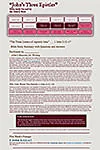Joseph
Who Was Joseph in the Old Testament?
Joseph’s story is found in Genesis 37–50. He was the eleventh son of Jacob, his first son through his favored wife, Rachel. After the announcement of his birth, we see Joseph next as a seventeen-year-old returning from shepherding the flock with his half-brothers to give Jacob a bad report of them. Their animosity toward Joseph peaked when they plotted to kill him in the wilderness. But he was sold to merchants who sold him to a high-ranking Egyptian named Potiphar. Eventually Joseph became the supervisor of Potiphar’s household.[1] Potiphar’s wife tried unsuccessfully to seduce him; after false accusations were leveled at Joseph he was imprisoned. Due to his ability to interpret Pharaoh’s dream, he was made governor of Egypt. He wisely rationed the country’s produce in preparation for a time of famine when Jacob’s sons came to Egypt to plead with Joseph for supplies. They didn’t recognize him but, after he was satisfied that they were reformed, he identified himself with great joy. He invited his father and brothers to come and settle in Egypt.
Joseph is often seen as an Old Testament equivalent, or prefiguration, of Christ.
• Enjoy this 1995 classic movie (3.0 hours, compliments of JezBoi17; two Primetime Emmy awards; three nominations): Starring as Joseph (Paul Mercurio), Potiphar (Ben Kingsley), Jacob (Martin Landau), Rachel (Alice Krige), and Potiphar’s wife (Leslie Ann Warren).
“Joseph” — 1995 — 3.5 million views
Joseph’s story also presents amazing insight into how God sovereignly works to overcome evil and bring about His plan. After all his ordeals, Joseph was able to see God’s hand at work. As he revealed his identity to his brothers, Joseph spoke of their sin this way: “Do not be distressed and do not be angry with yourselves for selling me here, because it was to save lives that God sent me ahead of you… It was not you who sent me here, but God” (Gen. 45:5, 8). Later, Joseph again reassured his brothers, offering forgiveness and saying, “You intended to harm me, but God intended it for good” (50:20). Man’s most wicked intentions can never thwart the perfect plan of God.[2]


